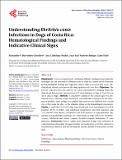| dc.contributor.author | Dolz, Gaby | |
| dc.contributor.author | Barrantes-González, Alexander V. | |
| dc.contributor.author | Jiménez Rocha, Ana Eugenia | |
| dc.contributor.author | Romero-Zúñiga, Juan José | |
| dc.date.accessioned | 2020-07-31T00:41:10Z | |
| dc.date.available | 2020-07-31T00:41:10Z | |
| dc.date.issued | 2016-11-30 | |
| dc.identifier.issn | Online: 2165-3364 | |
| dc.identifier.issn | Print: 2165-3356 | |
| dc.identifier.uri | http://hdl.handle.net/11056/17785 | |
| dc.description.abstract | Background: A cross-sectional study combining different serological and molecular
techniques for the detection of Ehrlichia canis in dogs was carried out to determine
hemopathological findings and suggestive clinical signs associated with acute, subclinical
and chronic infections in the dog population of Costa Rica. Objectives: The
present study describes and analyzes, in a more representative sampling frame, the
clinical and hematological presentation of E. canis infection in dogs of Costa Rica in
all its clinical stages. Methods: A descriptive analysis of the clinical signs was performed
from a 441-dog sample. Serological and molecular techniques for the detection
of Ehrlichia canis in dogs were applied. One and two-way ANOVA were carried
out to determine the effect of the infection status on the hematological parameters.
Results: A total of 0.7% (3/407) dogs were found with acute (seronegative but PCR
positive), 29.7% (121/407) with subclinical (seropositive and PCR negative), and
2.5% (10/407) with chronic (seropositive and PCR positive) E. canis infections. Significant
hemopathological findings were determined in dogs with acute (thrombocytosis),
subclinical and chronic (anemia, thrombocytopenia, leukopenia) E. canis
infections. Conclusions: Future studies must determine if dogs with subclinical E.
canis infections eliminated the agent without any medication, or if they continue to
be persistently infected, and will develop the chronic disease at some point in their
lives. | es_ES |
| dc.description.abstract | Antecedentes: Se llevó a cabo un estudio transversal que combinaba diferentes técnicas serológicas y moleculares para la detección de Ehrlichia canis en perros con el fin de determinar los hallazgos hemopatológicos y los signos clínicos sugestivos asociados a las infecciones agudas, subclínicas y crónicas en la población canina de Costa Rica. Objetivos: El presente estudio describe y analiza, en un marco de muestreo más representativo, la presentación clínica y hematológica de la infección por E. canis en perros de Costa Rica en todas sus etapas clínicas. Métodos: Se realizó un análisis descriptivo de los signos clínicos a partir de una muestra de 441 perros. Se aplicaron técnicas serológicas y moleculares para la detección de Ehrlichia canis en perros. Se realizaron ANOVA de una y dos vías para determinar el efecto del estado de la infección en los parámetros hematológicos. Los resultados: Se encontraron un total de 0,7% (3/407) perros con infecciones agudas (seronegativas pero positivas por PCR), 29,7% (121/407) con infecciones subclínicas (seropositivas y negativas por PCR), y 2,5% (10/407) con infecciones crónicas (seropositivas y positivas por PCR) por E. canis. Se determinaron hallazgos hemopatológicos significativos en perros con infecciones agudas (trombocitosis), subclínicas y crónicas (anemia, trombocitopenia, leucopenia) de E. canis. Conclusiones: Los estudios futuros deben determinar si los perros con infecciones subclínicas de E. canis eliminaron el agente sin ningún tipo de medicación, o si continúan infectados de forma persistente, y desarrollarán la enfermedad crónica en algún momento de sus vidas. | es_ES |
| dc.language.iso | eng | es_ES |
| dc.publisher | Universidad Nacional, Costa Rica | es_ES |
| dc.rights | Acceso abierto | es_ES |
| dc.rights.uri | http://creativecommons.org/publicdomain/zero/1.0/ | * |
| dc.source | Open Journal of Veterinary Medicine Vol.6 No.11 | es_ES |
| dc.subject | EHRLICHIA CANIS | es_ES |
| dc.subject | EPIDEMIOLOGIA VETERINARIA | es_ES |
| dc.subject | ENFERMEDADES INFECCIOSAS | es_ES |
| dc.subject | EHRLICHIA | es_ES |
| dc.subject | PATOLOGÍA ANIMAL | es_ES |
| dc.subject | EPIDEMIOLOGY | es_ES |
| dc.subject | HEMATOPATHOLOGY | es_ES |
| dc.subject | INFECTIOUS DISEASES | es_ES |
| dc.subject | CLINICAL PATHOLOGY | es_ES |
| dc.title | Understanding Ehrlichia canis infections in dogs of Costa Rica: hematological findings and indicative clinical signs | es_ES |
| dc.type | http://purl.org/coar/resource_type/c_6501 | es_ES |
| dc.description.procedence | Escuela de Medicina Veterinaria | es_ES |
| dc.identifier.doi | 10.4236/ojvm.2016.611020 | |


